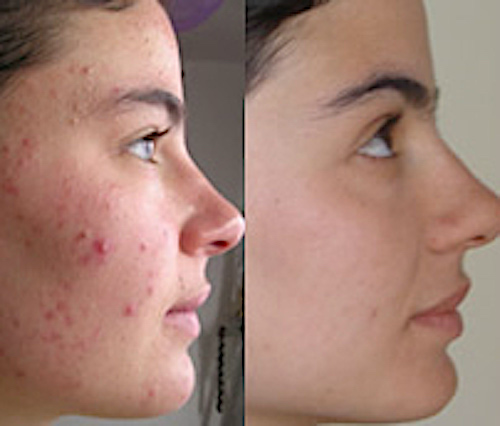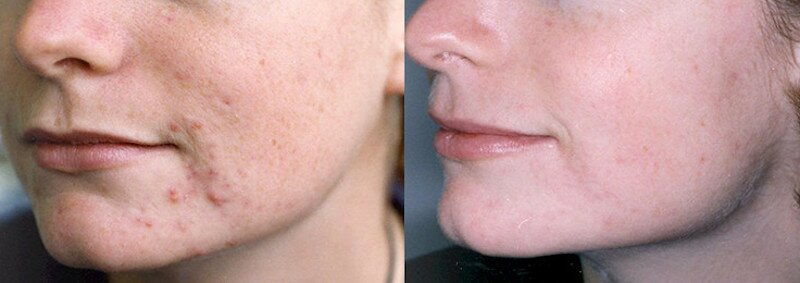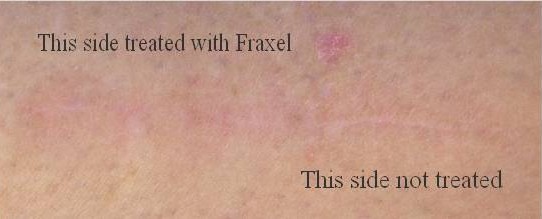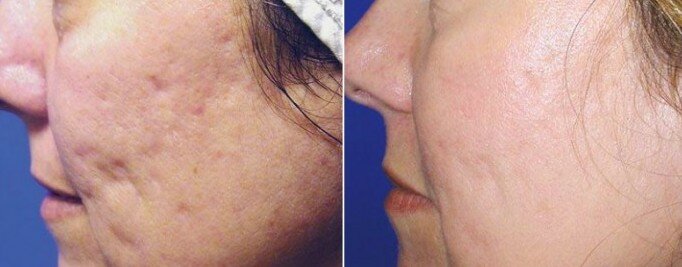|
Acne is one of the most common of all skin problems. It affects most teenagers to some degree and even more adults. Acne shows up as whiteheads, blackheads, pimples and deep painful bumps that look like boils. Acne most commonly occurs on the face but can also appear on the neck, back, chest and shoulders. It is estimated that as many as 80% of people between 12 and 25 years of age suffer from acne. While in most people, acne clears up after few years, many suffer from permanent scarring of the skin. Even when there are few physical marks left, the emotional ones can be devastating.

Acne problems are commonly faced by many young adults and teenagers today. Some people develop acne even at forties and fifties.

According to Celebrity Dermatologist Dr. Rothfeld at the Acne NYC Treatment Center in New York, NY acne is believed to develop due to various factors like hormonal imbalance, sebum secretion, hereditary factors, and food habits.
Acne NYC Treatment Center headed by Celebrity Dermatologist Dr. Gary Rothfeld is a board certified NYC Dermatologist with a New York City office in Manhattan, New York providing expert skin care, dermatology, and cosmetic dermatology services.
A Park Avenue practice with an international reputation in general, cosmetic, and surgical dermatology.
Acne Treatment Center
Opened 7 Days a Week for Treatment in New York, NY
SPECIALIST IN TEEN AND ADULT ACNE
Acne is often considered a predominantly teenage affliction, but it can also affect many people long into adulthood. People can suffer from adult acne into their twenties, thirties and even as late as their forties. In such cases the effect on self-esteem and self-confidence can be serious and can even cause depression, which is why sufferers often seek adult acne treatment.
Popular Treatments
Advanced Salicylic skin peel
Advanced Glycolic Peels
VI Peels
TCA Peels
Advanced Pyruvic skin peel
Isolaz® treatment
Isolaz® treatment & Peel
WHY DOES ACNE AFFECTS ADULTS?
Adult acne is caused by excess oil production which clogs the pores and causes a reaction in the skin. It can also be caused by an increase of testosterone. Acne normally appears during puberty and decreases over time, but this is not always the case. Sometimes it can carry on into adulthood, which can be a cause of great distress. Many adults are also left with acne scars even when the condition has improved, and this can be just as difficult to deal with as the acne itself, leading many people to seek out effective adult acne treatment.
ADULT ACNE TREATMENT
The main forms of acne treatment for adults at include:
ISOLAZ LASER TREATMENT TO TREAT ADULT ACNE
Laser technology has purifying powers and is a safe and painless way to treat skin affected by adult acne. The high-tech treatment Isolaz® is used to purify the skin, and when combined with skin peels it cleans the skin and tones it to improve complexion and lead to long-lasting results.
SALICYLIC SKIN PEELS
This advanced chemical skin peel is perfect for helping acne. The Beta Hydroxy Acid that the peel contains reduces the oil production in your skin, reducing the number of spots. The other chemical properties of this peel will help to control bacteria and inflammation.
THE RESULTS YOU CAN EXPECT FROM ADULT ACNE TREATMENT
In most cases of adult acne treatment, a six-week treatment program is suitable, and in the majority of cases this is enough to lead to dramatic and long-lasting results.
You will generally begin to notice a real difference just a few weeks after starting adult acne treatment as the acne begins to fade.The skin becomes smoother and clearer, and the scarring becomes significantly less noticeable. All of this will lead to an improvement in self-confidence and give you a new lease of life.
NYC dermatology specializes in chemical peels, vein injections, laser, restylane, Perlane, Botox Injections, Juvederm, Sculptra, Radiesse, Botox, non-surgical facelifts,non-surgical nose job, and the liquid facelift.
One particularly exciting use of Botox is the non-surgical Brow Lift. This procedure elevates the brow and can also elevate droopy eyelid skin. Dr. Rothfeld has helped countless patients avoid unnecessary plastic surgery with this procedure.
As an expert in the field of dermatology and cosmetic dermatologic surgery, Dr. Rothfeld is has appeared on national television shows. Dr. Rothfeld has also been quoted in many high profile national magazines.
Our goal at the manhattan office of Board Certified Derrmatologist , Dr. Gary Rothfeld is to create an atmosphere of professionalism, trust and complete patient satisfaction at the New York Dermatology Dermatology and Cosmetic Surgery Center in Manhattan, New York. Dr. Rothfeld, Dermatology Director of NYC Dermatolgy is a Board Certified Dermatologist at NYC Dermatology who has treated many patients in the entertainment industry.
Schedule an appointment with our top doc at our office which provides top of the line expert skin care, dermatology, cosmetic dermatology services, and advanced dermatology laser treatments for cosmetic needs and medical skin conditions. We offer a full range of services including surgery for skin cancer, laser hair removal, Botox®, the Fractionated Resurfacing laser, Titan laser, and acne photodynamic treatments. Our main goal is to provide you with the most effective and advanced treatment.
Any questions or to make an appointment click here 
Trained in Dermatology, New York Dermatolgy headed by top doc Board Certified Dermatologist Dr. Gary Rothfeld possesses the special knowledge, skills and professional capability that distinguishes him as an outstanding Dermatologist in NYC , Manhattan , New York at NYC Dermatology by Board Certified Dermatologist. Top New York City Dermatologist, Dr. Rothfeld in Manhattan treats the most difficult cases until the problem clears. Dr. Rothfeld, a Board Certified Dermatologist at New York Dermatology in Manhattan, New York is caring, detailed, and meticulous and will never give up until the problem is cleared.
Dr. Rothfeld, a board certified dermatologist in nyc who practices Dermatology in Manhattan, New York has treated many patients in the entertainment and music industry is caring, detailed and meticulous and will not give up until the condition resolves. Dr. Rothfeld is recognized as one of the best Dermatologist in NYC and the nation by the entertainment industry in the United States of America.
At NYC Dermatology by board certified Dermatologist Dr. Rothfeld, a Board Certfied Dermatologist uses multiple mechanisms at the same time to clear up your condition. Manhattan Dermatologist, Doctor Gary Rothfeld sees patients 7 days a week including Saturday and Sunday. NYC Cosmetic Dermatologist , Dr. Gary Rothfeld has consulted many entertainers in Hollywood. New York City Dermatologist Dr. Rothfeld always tries to be current on all the latest advancements at NYC Dermatology and Cosmetic Dermatological surgery.
Come in and we will give you the best and top of the line dermatologist advice on how to clear or correct the problem. Dr. Rothfeld at New York Dermatology board certified dermatologist is best known in giving his best in trying to make the patient happy. Dr. Rothfeld is best known for fixing other problems that other doctors could not.
Any questions or to make an appointment click here 
Inflammatory lesions in acne
Inflammatory lesions in acne (pimples or zits) include small red bumps (papules), pustules, large red bumps (nodules) and cysts (these are fluctuant nodules). They are often painful.What is the cause of inflammatory acne?
They usually result from rupture of the wall of the closed comedone but may arise from normal-appearing skin.
The factors contributing to inflammation are:
- Bacteria Chemicals produced by Propionibacterium acnes diffuse into the surrounding skin (dermis) and attract white blood cells (polymorphonucleocytes and monocytes).
- Immunological reaction For unknown reasons, the cells lining the sebaceous ducts also produce inflammatory mediators (IL-1a, IL-b and tumour necrosis factor) so pimples may occur in the absence of bacteria.
- Foreign body reaction White blood cells (macrophages and giant cells) removing the debris may cause a more severe granulomatous inflammatory reaction.
- Irritation by lipids Free fatty acids and sebum penetrate the dermis after the duct has ruptured
- Hypersensitivity to P. acnes Hypersensitivity (allergy) to P. acnes is thought to be the cause of the severe skin condition, acne fulminans.
There are many treatment options for adult acne problems, but it is not mandatory that everyone gets cured. Dermatologists prescribe medicines taking skin care into concern. In many cases, blood and urine tests are taken, to test for any underlying causes. Severe acne patients are given antibiotics and very severe adult acne patients are treated with laser surgery, considering the seriousness of the problem. People suffering from acne should consult board certified dermatologists like Dr. Gary Rothfeld and then undergo treatments that are suitable to them.
Acne treatments are always done on the basis of severity of condition. Mild acne problems can be treated with topical products containing benzoyl peroxide, salicylic and glycolic acids. Some persistent acne patients may require systematic antibiotics like tetracycline, erythromycin, and accutane. New methods like chemical peels and lasers are also included in the treatments to eradicate pimples and the marks present.
Comedo Extraction
Sometimes removing comedones proves beneficial. To extract whiteheads and blackheads, dermatologists use a sterile pen-sized device. This procedure should only be performed by a dermatologist. Patients’ attempts to extract comedones and drain cysts by squeezing or picking, can lead to worsening of the acne, scarring and infection. Tissue injured by squeezing or picking can become infected by staphylococci, streptococci and other bacteria. Dr. Gary Rothfeld, a board certified dermatologist at NYC Dermatology performs this procedure personally.
In many cases, acne cannot be cured completely, but can definitely be controlled in almost every case. Some basic steps need to be followed by adults. They should always touch their face gently, even when washing. Their diet should be as healthy as possible, and they should avoid oily or greasy foods whenever possible. Men should be careful while shaving using electric or ordinary razors, as these can negatively affect acne.
When pimples arise, the need to flatten them out and squeeze is understandable. Unfortunately though, this may lead to short and long-term problems such as persistent redness, large brown stains (hyperpigmentation) and scarring (loss of skin substructure). Stains and scars are often confused by patients – stains are pale or brown flat marks whereas scars can be seen as indentations or pock marks in the skin. It’s now recognized that scars can also develop from small as well as large lumpy pimples.
For both scars and stains, the best treatment is avoidance - that is, preventing the acne in the first place or at least treating it early and avoiding picking or squeezing the spots.
To treat acne and prevent new scars from forming, you should remember:
- You should get help for your acne as soon as you notice it as early treatment minimizes the severity of acne and the risk of scarring
- Effective acne treatments are available
- You can control and cover the visible lesions and avoid embarrassment
Types of Acne Scars
It is common to have stains and mild scars from acne. Stains will generally improve with time and can be helped to improve more quickly with skin care treatments such as topical retinoids, alpha-hydroxy acids and therapeutic exfoliating facials. For many of those with mild scars, they may not even be aware of it – some of these may improve over time. However, severe scarring may be more difficult to treat.
There are a number of types of scars caused by acne.
- Ice pick scars - Deep pits, that are the most common and a classic sign of acne scarring.
- Box car scars - Angular scars that usually occur on the temple and cheeks, and can be either superficial or deep, these are similar to chickenpox scars.
- Rolling scars - Scars that give the skin a wave-like appearance.
- Hypertrophic scars - Thickened, or keloid scars.
Acne Scar Treatment Facts:
- Ideally, acne should be quiescent or controlled before treating scars
- Treatments for scars depend on the specific scar type
- Treatment also depends on your skin type.
- Embarrassment from is most often due to facial scars – effective treatment can lead to an improvement in self-image and confidence
- Scars on the chest and back will also respond to intralesional steroid injections. For Acne Scars on the Face: Skin Fillers/injectables: Materials are injected into the depressed area of the scar to elevate it to the level of the normal surrounding skin. This treatment is best for scars with smooth shoulders such as thumbprint or rolling scars. Evaluating whether individual scars will respond to fillers is easily done by placing slight tension at the scar edge – if this improves the appearance of the scars, fillers will help. There are temporary and permanent fillers - examples are: Artecoll®, Zyplast®, Restylane®, and HylaForm®, and Cosmoplast. At NYC Dermatology by board certified dermatologist Dr. Gary Rothfeld customizes every patients' therapy on an individual basis.
Non-ablative collagenosis:
New laser and radiofrequency devices are being evaluated for enhancing collagen formation in deeper skin layers without damaging the skin surface. It is possible that these treatments may also prove useful in acne scarring.
Photorejuvenation:
Using laser or broadband visible light, 5-6 treatments that are performed every 3-4 weeks. This treatment improves mild acne scarring by causing new collagen formation. Dr. Rothfeld at NYC Dermatology performs these procedures.
Fraxel laser approved for acne scar treatment
Got acne scars? There’s a new laser on the market that has been garnering remarkable results in eradicating those unsightly pits.
The FDA recently approved the Fraxel laser for the treatment of acne scarring. First introduced in 2004 for the treatment of age-related wrinkles and sun-damage, this laser works by gently “resurfacing” the skin and replacing the damaged goods with new, healthy tissue.
Most acne scar patients need only three to four treatments. There’s minimal downtime, if any at all, according to researchers at Stanford University who conducted studies on the Fraxel.
The results and numbers are impressive with 92 percent of study participants still demonstrating significant improvement in scar severity three months after treatment ended. Check with your board certified dermatologist Dr. Gary Rothfeld to see if Fraxel might be right for you.
Laser - Fraxel laser
Filling a need
Fractional resurfacing is a breakthrough in improving the quality of the skin. This revolutionary treatment can be helpful in addressing many bothersome skin problems such as wrinkles, acne scars, scars, sun damage, brown spots and other skin problems. The true advantage of the technology is the ability to achieve great results with minimal downtime.
Below is a patient who allowed treatment of one part of her surgical scar with 3 Fraxel sessions. The treated part of the scar has partially faded into the skin improving the appearance.

Below is a Dermatology patient before and after 3 Fraxel treatments for her acne scars.

Resurfacing:
a) Ablative Laser Treatments: - Laser resurfacing (CO2 laser, Erbium Yag laser): These resurfacing lasers remove the surface layer of skin and cause a zone of heat injury. The healing process allows for reformation with younger less scarred skin and deeper layer of new collagen formation.
b) Dermabrasion: - This is a mechanical procedure in which a rapidly rotating wire or brush is used to strip off the surface irregularities of skin. Felt by most experts to be the most effective primary treatment for extensive scarring, it can be used in conjunction with fillers and excision
Dermatologist to the Stars Dr. Rothfeld, recognized by the by the entertainment industry of America as one of the best dermatologists in Manhattan, has organized a comprehensive skin care center offering personalized state of the art services including medical,pediatric, and cosmetic dermatology.
New York Dermatology serves the following neighborhoods within New York (NY), which are in close proximity to our office:
Upper East Side Dermatology, Fifth Avenue Dermatology, Park Avenue Dermatology, Madison Avenue Dermatology, Upper West Side Dermatology, Midtown Dermatology, Lower East Side Dermatology,Chelsea Dermatology, Gramercy Park Dermatology, Murray Hill Dermatology, Greenwich Village Dermatology, East Village Dermatology, West Village Dermatology, Soho Dermatology, Tribeca Dermatology, Meatpacking District Dermatology, Sutton Place Dermatology, Wall Street Dermatology, Hells Kitchen Dermatology, and the boroughs of Brooklyn Dermatology , Bronx Dermatology, Queens Dermatology and Staten Island Dermatology.
Dr. Gary Rothfeld is recognized as one of the best Dermatologist in New York, NY, Manhattan, NYC, New York City and the nation by the entertainment industry in the United States of America. At New York Dermatology headed by board certified Dermatologist Dr. Rothfeld, sees patients 7 days a week including Saturday and Sunday.
We accept all credit cards as well as debit cards for payment of services.
Open 7 Days A Week — Se Habla Español
|